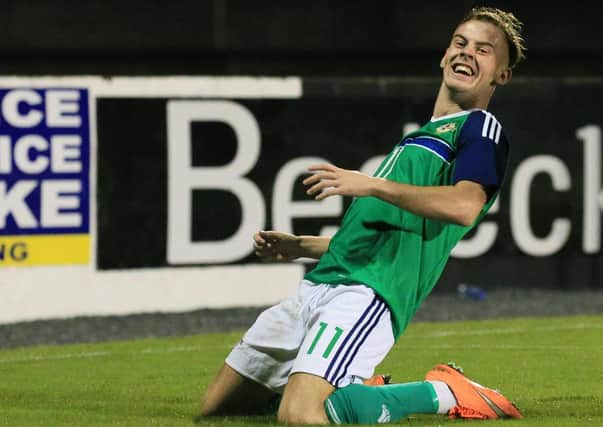Mark Sykes controversy: We need to make it harder for players to defect to RoI – or at least get compensation


The former under-21 manager is now in charge of the senior team, taking over from Michael O’Neill, whose tenure was so memorable and successful.
Baraclough did not expect that his announcement would be tarnished by the decision of one of Northern Ireland’s emerging players, Mark Sykes, to switch allegiance to the Republic of Ireland.
Advertisement
Hide AdAdvertisement
Hide AdThe midfielder, who plays in the third tier of English football for Oxford United, was previously involved in three international squads, but had not yet made a first team appearance.


Sykes’ decision is particularly galling for the Irish FA, which runs Northern Ireland football, because he was a product of the association’s youth teams.
He represented his country at multiple levels, even when he plied his trade in the Irish League, taking advantage of the IFA’s Club NI system for developing elite players.
One of Michael O’Neill’s achievements was that he seemed to have stemmed the flow of footballers defecting to the Republic. Partly, that was due to the success of his team, which qualified for the European Championship in 2016 and then twice made the play-offs for major tournaments. However, O’Neill’s formidable powers of persuasion were also a major factor.
Advertisement
Hide AdAdvertisement
Hide AdHe took care to talk to young players who were at risk of being poached by the southern football authorities.
In 2018 he addressed rumours that QPR forward Paul Smyth had been approached by the Football Association of Ireland.
The FAI pursue “one type of player: Catholic,” O’Neill alleged.
“You could argue that’s sectarian in terms of... recruitment.”
Advertisement
Hide AdAdvertisement
Hide AdAs an example he cited Northern Ireland’s midfielder, Paddy McNair.
“The FAI thought he must be a Catholic, and when they found out he was a Protestant, they stayed away from it.”
Under FIFA’s rules, any player who is eligible for Northern Ireland is also entitled to play for the Republic, unless they have already played competitively for the first-team.
In the south, and among many northern nationalists, this is viewed as a right underpinned by citizenship and identity. Northern Ireland fans believe it puts their team at a disadvantage that may be unique in world football.
Advertisement
Hide AdAdvertisement
Hide AdWhen the IFA challenged the Republic’s interpretation of the rules at the Court of Arbitration of Sport (CAS), they lost their case, on the basis that the player in question, Daniel Kearns, was a dual national.
His Irish citizenship entitled him to represent the Republic and he qualified for Northern Ireland because, just like the majority of people who are born here, he held automatic British citizenship.
Ironically, the rules that enable the FAI to select Northern Irish players rest on an interpretation of British citizenship law that nationalist parties are campaigning to change.
Regardless of these details, FIFA has shown consistently that it will not address Northern Ireland’s grievance. Footballers from Northern Ireland will remain eligible to play for the Republic for the foreseeable future.
Advertisement
Hide AdAdvertisement
Hide AdEffectively, the IFA has accepted this regrettable situation and has decided to manage it as best it can. It will continue to make its setup attractive, welcoming and representative of the whole of Northern Ireland, in contrast to the Republic’s selection strategy, which threatens to build a form of football apartheid on the island.
The IFA, though, might find its arguments gain more traction when it comes to players switching allegiance after they have played for international youth teams.
Ian Baraclough expressed justifiable frustration that resources that could have been used to nurture another talented youngster were wasted on Sykes.
“He may just have taken that opportunity away (from another player),” the manager noted.
Advertisement
Hide AdAdvertisement
Hide AdUnlike the eligibility situation, this problem isn’t unique to Northern Ireland either. Appropriately, the Republic had its own high-profile defector, Declan Rice, who decided to play for England, after taking advantage of the Irish youth system.
The media are now speculating about the future of Liverpool’s Welsh defender, Neco Williams, who is still eligible to switch to England.
To prevent international football becoming a farce, FIFA could change its rules so that players are tied to their country after they compete for its under-21 team.
At the very least, when young footballers change their allegiance at this late stage, the association that developed them should be entitled to some compensation.
Advertisement
Hide AdAdvertisement
Hide AdUnfortunately, the authorities that run football are rarely drawn in the direction of good sense. Rather than tightening up its rules, FIFA is discussing allowing players to play three senior competitive games for their country, before they’re prevented from switching to another team. At the moment, they are tied to an association after one competitive first-team game.
If anything, it looks like the integrity of international football is likely to be degraded further, and Ian Baraclough’s job will only become harder.
– Owen Polley is a unionist writer and commentator
Advertisement
Hide AdAdvertisement
Hide Ad________________________
A message from the Editor:
Thank you for reading this story on our website. While I have your attention, I also have an important request to make of you.
With the coronavirus lockdown having a major impact on many of our advertisers — and consequently the revenue we receive — we are more reliant than ever on you taking out a digital subscription.
Subscribe to newsletter.co.uk and enjoy unlimited access to the best Northern Ireland and UK news and information online and on our app. With a digital subscription, you can read more than 5 articles, see fewer ads, enjoy faster load times, and get access to exclusive newsletters and content. Visit https://www.newsletter.co.uk/subscriptions now to sign up.
Advertisement
Hide AdAdvertisement
Hide AdOur journalism costs money and we rely on advertising, print and digital revenues to help to support them. By supporting us, we are able to support you in providing trusted, fact-checked content for this website.
Alistair Bushe
Editor